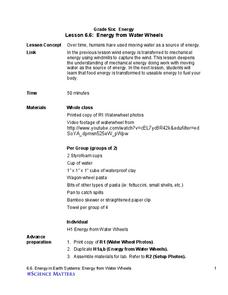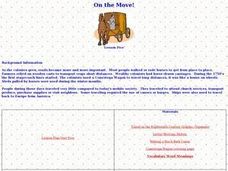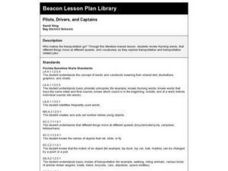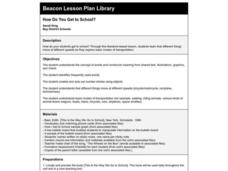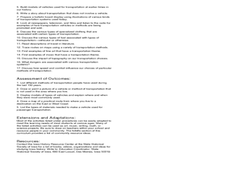Science Matters
Energy from Water Wheels
Historians believe the first vertical water wheel was invented in Rome during the Augustan Age. The sixth lesson in the series of 10 has scholars experiment with designing their own water wheels. Through testing various pastas and...
Curated OER
Take a Plane or a Train
Students listen to the song, The Wheels on the Bus. Instead of a bus, students attempt to sing the song using a different mode of transportation.
Curated OER
On the Move! Lesson Five
Fifth graders research how the colonists traveled in the eighteenth century. In this transportation lesson, 5th graders complete a graphic organizer about modes of transportation today. Then they discuss the differences for colonial...
Curated OER
Go Far in a Car
Students listen to the song, The Wheels on the Bus. They are shown the book, This is the Way We Go to School. Afterward, they learn the phonetic principle of rhyming words.
Curated OER
How Does It Move?
Students listen to the song, The Wheels on the Bus. They attempt to sing the song again, but change it for a tractor. They watch the book, A Visit With Grandma, through a projector, LCD panel, or big screen television and develop their...
Curated OER
Make-and-Take: Staff Development
Students complete activities to learn a phenomenological approach to polygons. In this polygons lesson plan, students use the materials in the directions to make demonstration models. Students use a wooden wagon model and liquid to learn...
Curated OER
Pilots, Drivers, and Captains
Students listen to the song, The Wheels on the Bus, then change the words for a boat.
Curated OER
1, 2, 3 Hooray for Number Equivalency!
Students represent equivalent amounts using concrete materials, number symbols, and number words.
Curated OER
Pasta Bridges
Students analyze the correct use of technology as it relates to math and science. For this science lesson, students investigate force and weight as it relates to building an object. They build a bridge and draw conclusion based on the...
Curated OER
Art -- The Secret to Freedom
Fourth graders create a coded message in a quilt. In this art lesson students demonstrate the communication used by the Underground Railroad. Students work in a group to make a quilt with a code in it.
Curated OER
The Secret to Freedom Teacher’s Guide
Students read the story "The Secret to Freedom" and participate in active reading to personalize what they have read. In this reading instructional activity, students follow several writing activities and discuss their work . Students...
Curated OER
Gold Fever
In this reading worksheet, students answer 10 multiple-choice questions about the book. For example, "Why did John Sutter ask James Marshall to keep the gold a secret?"
Curated OER
Native American Necklaces
First graders make an "ABB" pattern from macaroni they dyed in a previous lesson plan. They follow the pattern as they string the macaroni to make a necklace. This lesson plan is a nice math/social studies tie in.
Curated OER
Handcarts - A Unique Form of Transportation
An interesting historical fact about how handcarts benefitted to the Mormon pioneers is the context behind this math lesson. Using given facts and figures regarding the handcart, pupil pairs create math word problems, share them with the...
Curated OER
Printing Practice Letter P
In this printing worksheet, students trace 4 uppercase letter P's. The first box provides arrows that guide students in tracing the letter.
Curated OER
Adventures along the Oregon Trail in Nebraska
Students discover how the land and people we develop relationships with in Nebraska affect our survival--past, present, and future. They write about and interview their grandparents, parents and peers and compare them with people on the...
Curated OER
Houses and the People They Shelter
Pupils examine different homes and shelters across cultures and time periods. In this Houses and the People They Shelter instructional activity, students draw conclusions about society and culture according to the features of their...
Curated OER
Making Craters
Students study craters and identify the different things that characterize craters. In this crater instructional activity students create a model of an impact crater.
Curated OER
Simple Machines, Survivor-Style
Students apply the principles of simple machines to create events in a wacky obstacle course. They work with a partner to prepare a visual presentation and an expository description of the obstacle course. Each group sequentially...
Curated OER
Thematic Unit ----Transportation
Young scholars identify and name six modes of transportation. Students name the purpose of each of the six modes of transportation. Young scholars categorize modes of transportation based on where they travel.
Curated OER
Transportation
Students learn all about how people and products get from place to place.
Curated OER
How Do You Get to School?
Students, through a literature based assignment, explore basic modes of transportation and examine how different things move at different speeds.
Curated OER
Getting from Place to Place
Learners examine modes of transportation. In this transportation lesson, students listen to their instructor present a lecture on modes of transportation over the past 300 years. Learners respond to questions about the lecture.
Other popular searches
- Wagon Wheels Brenner
- Wagon Wheels Lesson Plans
- Matter Wagon Wheels
- Ipod Wagon Wheels
- Pod Wagon Wheels
- Wagon Wheels + Brenner
- Wagon Wheels Oregon Trail
- Pod, Wagon Wheels


